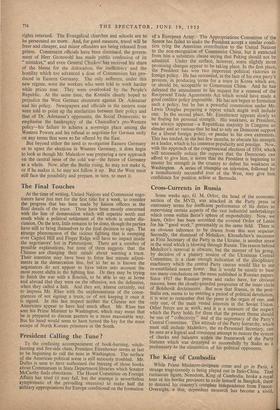President Calling the Tune ?
To the confusing accompaniment of book-burning, witch- hunting and fire-side chats, President Eisenhower seems at last to be beginning. to call the tune in Washington. The surface of the American political scene is still seriously troubled. Mr. Dulles is seen to have authorised the burning of those books about Communism in State Department libraries which Senator McCarthy finds obnoxious. The House Committee on Foreign Affairs has tried (it may fail, but the attempt is nevertheless symptomatic of the prevailing situation) to make half the military appropriations for Europe conditional on the formation of a European Army. The Appropriations Committee of the Senate has failed to make the PreSident accept a similar condi- tion tying the American contribution to the United Nations to the non-recognition of Communist China, but it extracted from him a substitute clause saying that Peking should not be admitted. Under the surface, however, some slightly more promising changes appear to be taking place. In the first place,. the President • has won two important political victories in foreign policy. He has succeeded, in the face of his own party's protests, in producing terms for a truce in Korea which are, or should be, acceptable to Communist China. And he has defeated the amendment to his request for a renewal of the Reciprocal Trade Agreements Act which would have made a good creditor policy impossible. He has not begun to formulate such a policy, but he has a powerful commission under Mr. Lewis Douglas preparing a report which might well include one. In the second place, Mr. Eisenhower appears slowly to be finding his personal strength. His weakness, as President, was always apparent—a Republican majority in Congress so slender and so various that he had to rely on Democrat support for a liberal foreign policy, or pander to his own extremists. This has tended, in the last few months, to obscure his strength as a leader, which is his immense popularity and prestige. Now, with the approach of the congressional elections of 1954, which will necessarily reduce the support that the Democrats can afford to give him, it seems that the President is beginning to muster his strength in the country to defeat his weakness in Washington. A series of triumphs on television, followed by a tumultuously successful tour of the West, may give him confidence for positive action at Bermuda.


















































 Previous page
Previous page